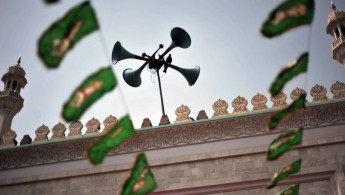Uproar after pro-government Saudi journalist urges silencing mosque loudspeakers
Saudis are up in arms after a journalist in pro-government Al-Watan newspaper voiced support for silencing mosque loudspeakers during sermons and prayers and cutting down the number of mosques in the kingdom.
Commenting on calls by some social media users to ban mosques from broadcasting live prayers, Saudi journalist Mohamed al-Suhaimi told local channel MBC that he was in favour of the controversial demand.
Suhaimi said the cacophony of non-synchronised calls to prayer and sermons broadcasted through loudspeakers were "terrifying for young children and the country as a whole".
The journalist suggested there were too many mosques in the kingdom, mockingly proposing giving 4x4s as gifts to those who attend dawn prayers in mosques.
He also criticised religious authorities for failing to apply a previous ban on mosques using loudspeakers for broadcasting sermons and recitations, accusing them of caving in to demands by the Sahwa Movement, which he suggested were affiliated to the Muslim Brotherhood.
The powerful Crown Prince Mohammed bin Salman (MbS) has recently orchestrated the detention of several clerics affiliated to the reformist movement, including Sheikh Salman al-Awdah, widely seen as a moderate. Awdah had called on the kingdom to seek 'harmony' with Qatar, which may have earned him the anger of the government in Riyadh.
MbS has since been pushing his own 'reformist' agenda, which many critics say does not target extremism as he claims as much as it seeks to co-opt the religious establishment to join his power grab.
Suhaimi's comments provoked angry responses, with many on social media calling on the government to hold him accountable for "inciting against religion".
In 2009, Saudi Arabia attempted to crack down on overly loud loudspeakers used to call the faithful to prayer to prevent them from drowning each other out.
The call to prayer is a central part of life for Muslims.
Many mosques put imams' sermons on the public sound system as well, so that those unable to go to the mosque can listen from home or the street.





 Follow the Middle East's top stories in English at The New Arab on Google News
Follow the Middle East's top stories in English at The New Arab on Google News
![The UAE is widely suspected of arming the RSF militia [Getty]](/sites/default/files/styles/image_330x185/public/2024-11/GettyImages-472529908.jpg?h=69f2b9d0&itok=Yauw3YTG)
![Netanyahu furiously denounced the ICC [Getty]](/sites/default/files/styles/image_330x185/public/2024-11/GettyImages-2169352575.jpg?h=199d8c1f&itok=-vRiruf5)
![Both Hamas and the Palestinian Authority welcomed the ICC arrest warrants [Getty]](/sites/default/files/styles/image_330x185/public/2024-11/GettyImages-2178351173.jpg?h=199d8c1f&itok=TV858iVg)